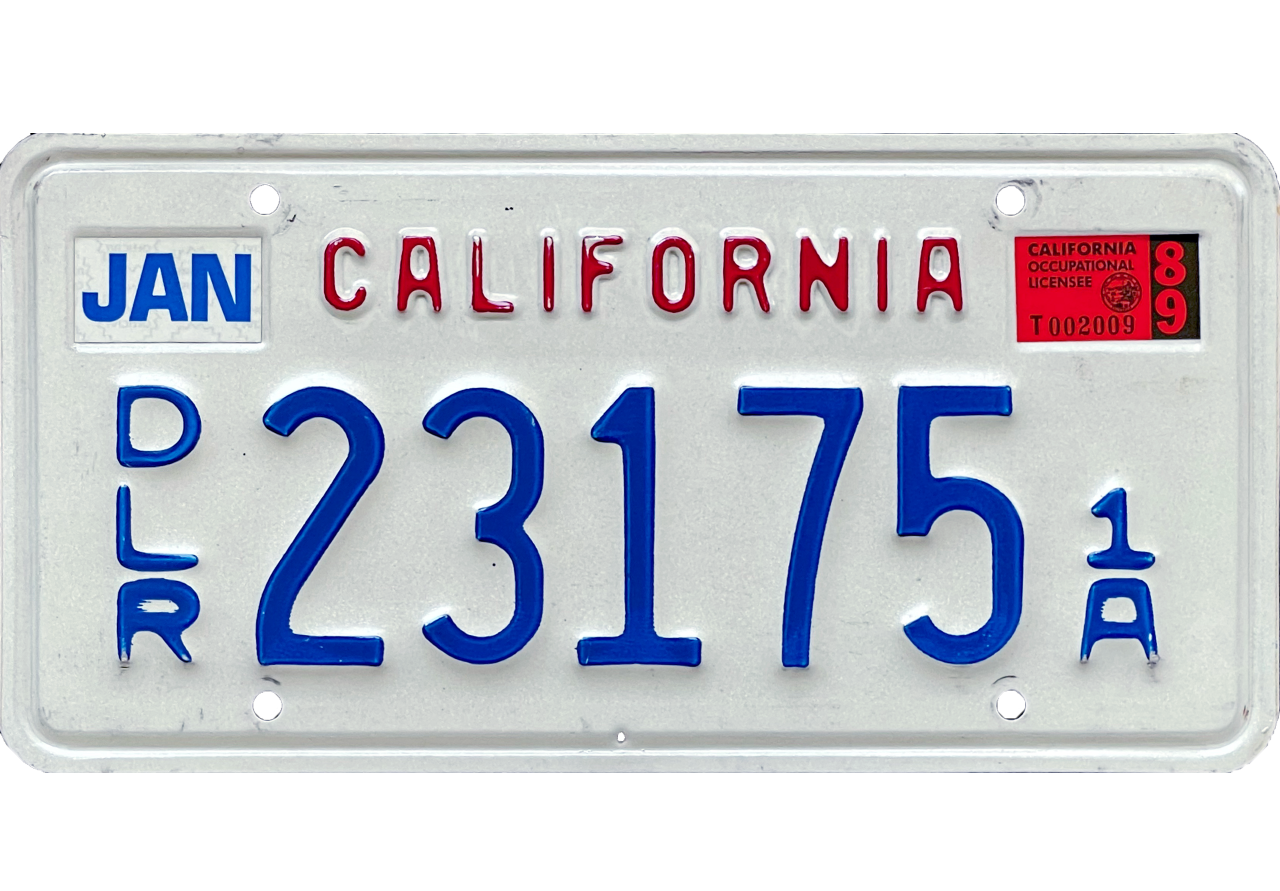How to Get Dealer License Plates in California: An Overview
May 7th, 2024 by Garrett Eddings
Dealer plates, also known as special plates or temporary plates, play a crucial role in the automotive industry, especially in California. They serve multiple purposes, from facilitating test drives to legalizing the temporary use of vehicles that are yet to be permanently registered. This article delves into the significance, regulations, and usage of dealer plates in California, providing a comprehensive understanding of their role and legal implications.
What Are Dealer Plates?

Dealer plates are specialized license plates issued to licensed vehicle dealerships. These plates allow dealers to operate vehicles that are part of their inventory without needing to register each one individually. The primary uses include test drives, transportation of vehicles, and demonstration purposes. Dealer plates simplify the process of moving cars from one place to another and help in showcasing them to potential buyers.
Who Can Drive on Dealer Plates?
There are two situations where someone can drive on dealer plates. The owner of the dealership or anyone in the ownership structure can drive anytime, anywhere for whatever reason. Everyone else needs to be through the course of conducting business.
Types of Dealer Plates
In California, there are several types of dealer plates, each serving a distinct purpose:
- Temporary Dealer Plates: These plates are issued to new or used car dealers and are used on vehicles that are temporarily in the dealer's inventory.
- Special Plates: Also known as "demo plates," these are used for demonstration purposes, allowing potential buyers to test drive vehicles.
- Manufacturer Plates: These are used by vehicle manufacturers for similar purposes, such as testing and demonstrating vehicles.
DMV Framework and Regulations
The issuance and use of dealer plates in California are governed by the Department of Motor Vehicles (DMV). To obtain dealer plates, a dealer must be properly licensed, and there are stringent requirements to maintain this status. The key regulatory aspects include:
- Dealer Licensing: To be eligible for dealer plates, businesses must obtain a dealer license from the California DMV. This involves meeting specific criteria, including having a permanent business location, meeting local zoning requirements, and passing an inspection.
- Usage Restrictions: Dealer plates can only be used on vehicles owned by the dealership. They cannot be used for personal purposes by the dealer or its employees. Misuse of dealer plates can result in penalties, including fines and suspension of the dealer’s license.
- Record-Keeping: Dealers must maintain detailed records of the usage of each dealer plate. This includes the vehicle identification number (VIN), dates of use, and purpose of use. These records must be available for inspection by the DMV at any time.
Benefits of Dealer Plates in California
Dealer plates offer several advantages to car dealerships:
- Cost Efficiency: By using dealer plates, dealerships save on the cost of registering each vehicle in their inventory. This is particularly beneficial for large dealerships with extensive inventories.
- Flexibility: Dealer plates provide the flexibility to move vehicles easily for test drives, repairs, or transport between locations. This enhances operational efficiency.
- Customer Experience: They improve the customer experience by allowing potential buyers to test drive vehicles without the need for temporary registration.
Compliance and Enforcement
The DMV conducts regular audits and inspections to ensure compliance with the regulations governing dealer plates. Dealers must adhere to the following practices to remain compliant:
- Proper Display: Dealer plates must be prominently displayed on the rear of the vehicle. They should not be obstructed or placed in a manner that obscures visibility.
- Insurance Coverage: Vehicles operating with dealer plates must be adequately insured. The insurance policy should cover test drives and other uses permitted under the dealer plate regulations.
- Timely Renewals: Dealer plates have an expiration date and must be renewed annually. Failure to renew on time can result in penalties and disruptions in dealership operations.
Penalties for Misuse
Misuse of dealer plates can lead to severe consequences. The DMV imposes strict penalties for violations, which may include:
- Fines: Monetary fines can be imposed for each instance of misuse.
- Suspension or Revocation: The dealer’s license to operate can be suspended or revoked, impacting their ability to conduct business.
- Criminal Charges: In extreme cases, fraudulent use of dealer plates can lead to criminal charges.
Recent Changes and Updates
In recent years, California has made several updates to the regulations surrounding dealer plates to enhance oversight and prevent abuse:
- Electronic Record-Keeping: Dealers are now encouraged to maintain electronic records of dealer plate usage, making it easier to track and audit their use.
- Enhanced Inspections: The DMV has increased the frequency and thoroughness of inspections to ensure compliance.
- Digital Plates: The introduction of digital dealer plates has been explored as a potential measure to reduce fraud and improve tracking.
Dealer plates are an essential tool for car dealerships in California, facilitating the smooth operation of their business by allowing flexible and cost-effective vehicle movement. However, their use is heavily regulated to prevent misuse and ensure that vehicles on the road are properly accounted for and insured. Dealers must stay informed about the latest regulations and maintain rigorous compliance to avoid penalties and ensure their operations run smoothly. With ongoing advancements and updates in the regulatory framework, the future of dealer plates may see even more changes aimed at improving efficiency and reducing fraud.
Posted in: Education
